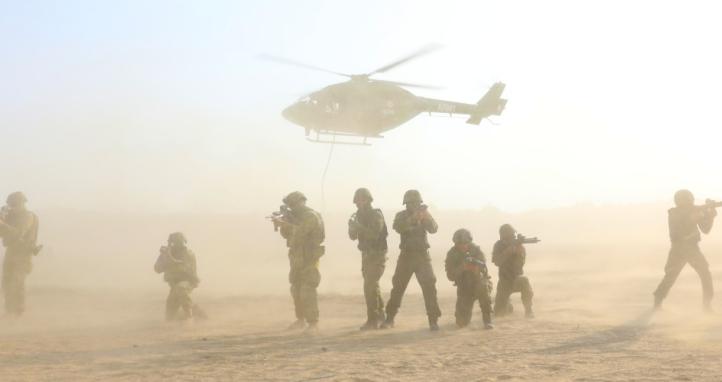Facts and figures
The 'Know Your Region' series is designed to support unit and individual professional military education on the South East Asian region. It's important for all serving members of our military to have a foundational knowledge of the countries and issues in the Indo-Pacific.
CHINA – HOT TOPICS
On this page:
- Summary
- South China Sea
- Taiwan
- Tibet
- Hong Kong
Summary
Surrounded by other powers attempting to balance each other, China, geopolitically speaking, is located in a somewhat complex neighbourhood, with fourteen countries sharing a border with China. Additionally, the Indo-Pacific region connects large swathes of the globe and has become a major geopolitical theatre in recent years.
South China Sea
The South China Sea is a critical commercial gateway for a significant portion of the world’s merchant shipping; hence, it is an important economic and strategic sub-region of the Indo-Pacific. It is also the site of complex territorial disputes, which have been the cause of tension within the region and throughout the Indo-Pacific.
For further information on the South China Sea, see the resources below:
- Videos
- Podcasts
- Articles
Taiwan
In 1949, following a period of civil war and conflict with Japan in WWII, the Chinese Communist Party (CCP) established the People’s Republic of China (PRC), with Beijing as its capital. The Nationalist forces under Chiang Kai-shek retreated to Taiwan, relocating the capital of the Republic of China (ROC) to Taipei. Under the Constitution of the ROC, the authorities in Taipei still claim to be the legitimate government of the whole of China. The Australian Government continued to recognise Taipei until the establishment of diplomatic relations with the PRC in 1972. Australia’s Joint Communiqué with the PRC recognised the Government of the PRC as China’s sole legal government and acknowledged the position of the PRC that Taiwan was a province of the PRC.
For further information on China and Taiwan see the resources below:
- Videos
- Podcasts
- Articles
Tibet
The Tibetan sovereignty debate refers to whether Tibet should separate and become a new sovereign state, but also, whether Tibet was independent or subordinate to China in certain parts of its recent history. It is generally held that China and Tibet were independent prior to the Yuan dynasty (1271–1368), and that Tibet has been ruled by the People's Republic of China (PRC) since 1951. The nature of Tibet's relationship with China in the intervening period is a matter of ongoing debate.
For further information on China and Tibet, see the resources below:
- Videos
- Podcasts
- Articles
Hong Kong
Hong Kong, officially known as the Hong Kong Special Administrative Region of the PRC, is a former British territory that reverted to Chinese sovereignty on 01 July 1997. Hong Kong is governed by the Basic Law of the Hong Kong Special Administrative Region of the PRC (the Basic Law), passed by China's National People's Congress (NPC) in 1990. The Basic Law serves as Hong Kong's 'mini-constitution'. It provides for independent executive, legislative and judicial powers, and accords the territory a high degree of autonomy under the principle of 'one country, two systems' in all areas except defence and foreign affairs (for which China is responsible).
For further information on China and Hong Kong see the resources below
- Videos
- Podcasts
- Articles
Discussion Questions
- China has one of the largest land borders of any nation in the world. How does this affect China’s foreign and military policies, and what lessons can be learnt from their management of so many international relationships?
- As China becomes increasingly assertive in pursuing its strategic goals and increasing its regional and global influence, some SE Asian nations are openly expressing concerns about some of this behaviour. What would these nations likely expect from Australia in response to their concerns? How will our own policies towards an increasingly assertive China influence our regional relationships?
- The last major British presence in Asia ended with the transfer of governance of Hong Kong back to China in 1997. With the deployment of a British Task Group to the Indo-Pacific theatre later this year, what are the likely UK intentions for engaging this region? How will this be viewed by China?
- China and Taiwan have a complex relationship that is influenced by cultural and political factors. What factors are at play for Australia when managing its relationship with Taiwan? What influence will our relationship with the US have on managing such a relationship?
Last Reviewed 07/2024
Know your region
Know Your Region series gives you a shortcut to understanding other nations in the Indo-Pacific region.









